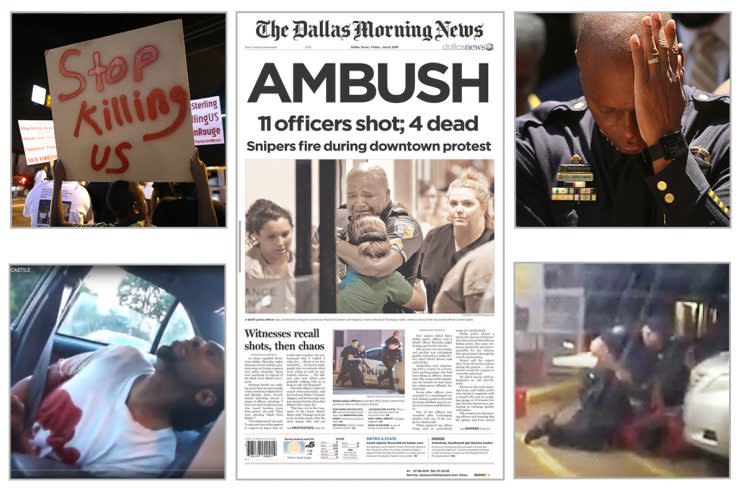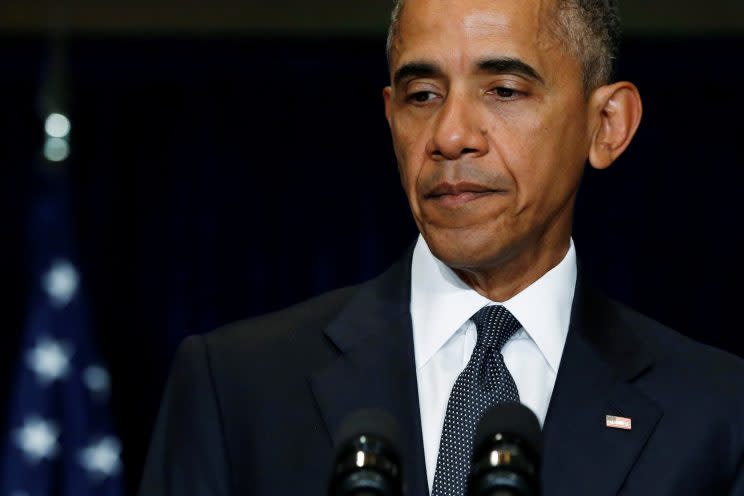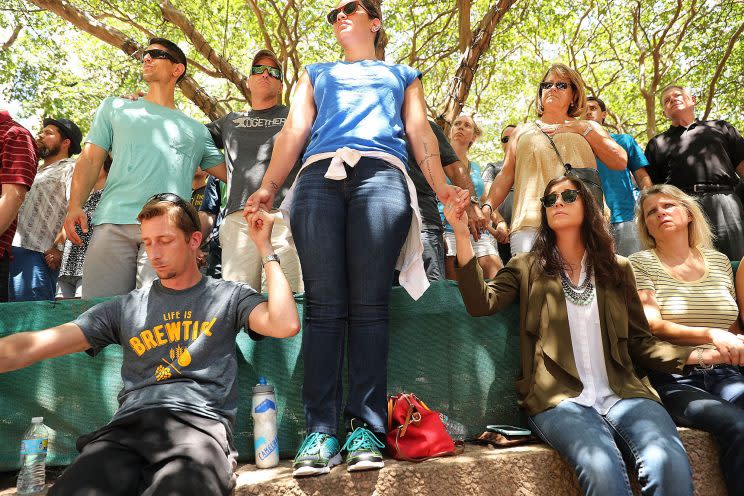7 lives that mattered: Reflections on a week’s deadly toll

For a few hours early Friday, the rolling catastrophe that 2016 seems to have become stunned the nation into silence. With the murders of five Dallas officers following the deaths of two black men at the hands of police, the United States had at last reached a situation so acute that even Donald Trump, who has made provocation his calling card, recognized calls for restraint. He issued a brief, dignified statement calling for the nation to come together with “love and compassion” and canceled some campaign events, as did his rival in the presidential race, Hillary Clinton. A week that began with celebratory fireworks was ending in a hush, as Americans looked into their souls and wondered: How did we get here?
SLIDESHOW: Photos: The shootings in Dallas >>>
We got here at the point of a gun — guns, actually, including the handguns with which police officers shot Alton Sterling at point-blank range, as he lay prone on the pavement in Baton Rouge, La., and Philando Castile, in the driver’s seat of his car in a suburb of St. Paul, Minn. And the rifle with which a young African-American man shot a dozen cops who had been guarding a peaceful Black Lives Matter rally. The news that some of the wounded officers had been taken to Parkland Memorial Hospital sent chills down the spine of anyone old enough to recall the day another man with a rifle plunged the United States into darkness from a window in Dallas.
SLIDESHOW: Alton Sterling killed by police in Baton Rouge, La. >>>
Friday came none too soon for both leading presidential candidates. Trump had found himself on the defensive for 48 hours over a retweeted image of Clinton that seemed to carry anti-Semitic overtones, something even his (Jewish) son-in-law conceded might have been “careless.” Clinton, even as she was cleared of criminal charges by the head of the FBI had to endure his description of her as “extremely careless” and “negligent” in handling classified emails as secretary of state.
When the books about the 2016 election campaign are written, these events will be put into their proper perspective. But for most Americans, the scenes that will stick in their memory from the week of July 4 will be of Dallas cops running with guns drawn toward the sound of shots fired, not realizing — or, perhaps, all too well aware — that they are themselves the targets; and of Philando Castile slumped behind the wheel, bleeding to death, as his girlfriend in the seat beside him tries to understand what has just happened. “Stay with me!” she pleads to him, as the clearly agitated officer at the car window shouts, “I told him not to reach for it!” — presumably meaning the handgun that he was, reportedly, licensed to carry. Diamond Reynolds retorts, calmly, “You told him to get his ID, sir.”
SLIDESHOW: Police fatally shoot Philando Castile in Falcon Heights, Minn. >>>
Of course, not everyone took this opportunity for solemn reflection. Every tragedy can be turned to political advantage by someone. “Black Lives Kill,” was the initial headline on the Drudge Report; the sun hadn’t risen on Dallas before the New York Post was on the streets with a Page 1 banner that read “Civil War.” On the far right, it was taken as a given that the real sympathies of Clinton and President Obama were with the cop killer. Corey Stewart, Trump’s Virginia state chairman, wrote on Facebook that “liberal politicians who label police as racists — specifically Hillary Clinton… are to blame for essentially encouraging the murder of these police officers tonight.” (Trump’s spokeswoman Hope Hicks disavowed the remarks.) Former Rep. Joe Walsh, R-Ill., achieved brief notoriety (brief because he took it down soon after posting it) for a tweet that, read literally, amounted to a threat against the president: “This is now war. Watch out Obama. Watch out black lives matter punks. Real America is coming after you.”
Trump, in his statement on the Dallas attacks, took note of “the senseless, tragic deaths of two motorists in Louisiana and Minnesota” — tragedies that he hadn’t bothered to address when they happened — which “reminds us how much more needs to be done.” He promptly called down on himself a rain of disappointment from his Twitter followers for calling the deaths “senseless,” a word choice that to some seemed insufficiently supportive of the police.

Obama, in Warsaw for a NATO meeting, issued a statement on the deaths of Sterling and Castile — “all Americans should be deeply troubled” — and then, a day later, on the Dallas attacks, which he called “a vicious, calculated and despicable attack on law enforcement.” For this he earned the disdain of Jim Pasco, the executive director of the Fraternal Order of Police, who complained, “We’d like to see the president make one speech that speaks to everybody, instead of one speech that speaks to black people as they grieve and one speech that speaks to police officers as they grieve.”
SLIDESHOW: Dallas pays tribute to fallen officers >>>
Obama’s statement also contained the obligatory Democratic reference to gun control, a red flag to Republicans. (“We also know that when people are armed with powerful weapons, unfortunately it makes attacks like these more deadly and more tragic.”). For her part, Democratic National Chairwoman Debbie Wasserman Schultz, in a joint statement with Black Caucus Chair Virgie Rollins, gave a less than ringing denunciation of the Dallas attacks as “unacceptable” near the end of a statement that was almost entirely about the Louisiana and Minnesota police shootings.
SLIDESHOW: Newspapers react to Dallas attack against police officers >>>
All of these events are “unacceptable,” as well as tragic and possibly criminal — but also unsettling in a uniquely contemporary way, for the shocking immediacy with which we witnessed them on the phones we carry in our pockets. And also because they happened in places and to people we had every reason to assume were safe. In a humdrum suburb of St. Paul, cops kill a young man who, if he really did have a license to carry a handgun, was presumptively a law-abiding citizen, and whose mother, hauntingly, recalled for the cameras how she had drilled into him the mantra every African-American parent repeats to her son: “Comply! Comply! Comply!” And a previously inconspicuous young veteran guns down cops in Dallas, a city whose mayor and police chief have taken exceptional steps to foster a good relationship with the black community. So how to assess the week’s toll? Two young civilians and five cops dead; seven families devastated, Reynolds’ 4-year-old daughter, who was in the car when Castile was shot, traumatized. And a shocked and horrified nation that now has to pick itself up and face what has already been forecast to be one of the most brutal election campaigns in its history. If history came with a reset button, this would be a good time to push it.


